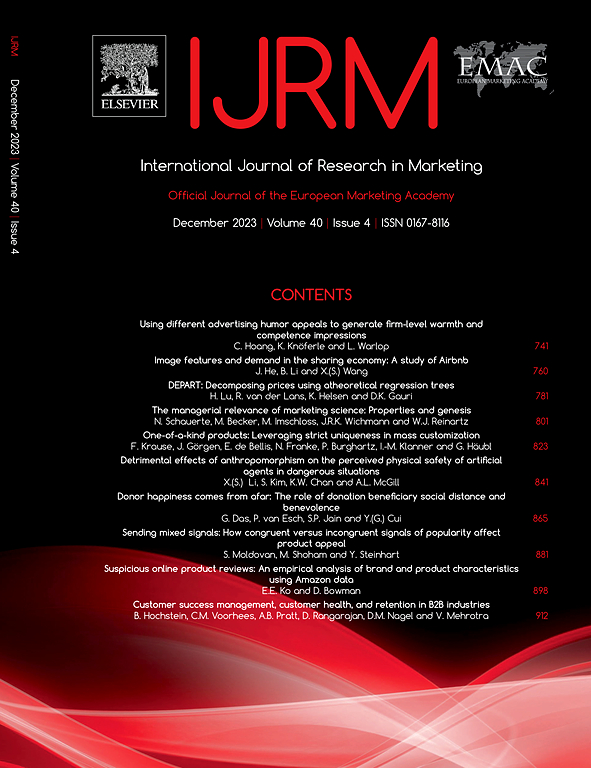不可替代代币(nft)作为数字品牌延伸:财务绩效和母品牌溢出效应的证据
IF 7.5
2区 管理学
Q1 BUSINESS
International Journal of Research in Marketing
Pub Date : 2025-09-01
DOI:10.1016/j.ijresmar.2025.01.001
引用次数: 0
摘要
在b区块链和Web3等新技术的推动下,品牌越来越多地向数字空间延伸。其中一种新颖的扩展是不可替代令牌(NFT)。许多例子表明,品牌在nft的市场表现在短期收入和对母品牌的溢出效应方面差异很大。然而,人们对与成功表演相关的因素知之甚少。我们研究的目的就是要找出这些因素。关于短期收益,我们对几个可能的成功驱动因素的价值进行了实证测试;这些驱动因素反映了物理品牌延伸最重要的成功因素(例如,延伸契合度,品牌资产)和NFT的价值驱动因素(例如,增加的NFT效用,活动中的NFT数量)的组合。使用450个NFT活动的新数据集,我们证明这两种类型的变量都有助于预测与品牌相关的NFT的财务收入。除了NFT活动的短期财务结果之外,我们还报告了实验证据,表明此类活动可能会对母品牌产生负面溢出效应。总体而言,本研究展示了(i)哪些价值驱动因素与品牌的nft成功相关,(ii)哪些品牌最适合nft, (iii)如果品牌经理想要在nft上取得成功,他们需要以何种方式将品牌延伸策略从实体环境调整到数字环境,以及(iv)品牌延伸与nft可能会损害客户对母品牌的态度的风险。本文章由计算机程序翻译,如有差异,请以英文原文为准。
Non-Fungible Tokens (NFTs) as digital brand extensions: Evidence on financial performance and parent-brand spillovers
Fueled by new technologies, such as blockchain and Web3, brands are increasingly extending into the digital space. One such novel extension is the non-fungible token (NFT). Numerous examples indicate that brands’ market performance with NFTs varies widely in terms of short-term revenues and spillovers to the parent brand. However, little is known about the factors that are associated with a successful performance. The goal of our research was to identify those factors. Regarding short-term revenues, we empirically tested the value of several possible success drivers; these drivers reflected a combination of the most important success factors for physical brand extensions (e.g., extension fit, brand equity) and value drivers for NFTs (e.g., added NFT utility, number of NFTs in the campaign). Using a novel dataset of 450 NFT campaigns, we document that both types of variables help to predict financial revenues from brand-related NFTs. Going beyond the short-term financial results of NFT campaigns, we also report experimental evidence that shows such campaigns may create negative spillovers for the parent brand. Overall, this research demonstrates (i) which value drivers correlate with a brand’s NFTs success, (ii) which brands are the best fit for NFTs, (iii) in what ways brand managers need to adapt their brand-extension strategies from the physical to the digital environment if they want to succeed with NFTs, and (iv) the risk that brand extensions with NFTs may hurt customers’ attitude towards the parent brand.
求助全文
通过发布文献求助,成功后即可免费获取论文全文。
去求助
来源期刊
CiteScore
11.80
自引率
4.30%
发文量
77
审稿时长
66 days
期刊介绍:
The International Journal of Research in Marketing is an international, double-blind peer-reviewed journal for marketing academics and practitioners. Building on a great tradition of global marketing scholarship, IJRM aims to contribute substantially to the field of marketing research by providing a high-quality medium for the dissemination of new marketing knowledge and methods. Among IJRM targeted audience are marketing scholars, practitioners (e.g., marketing research and consulting professionals) and other interested groups and individuals.

 求助内容:
求助内容: 应助结果提醒方式:
应助结果提醒方式:


